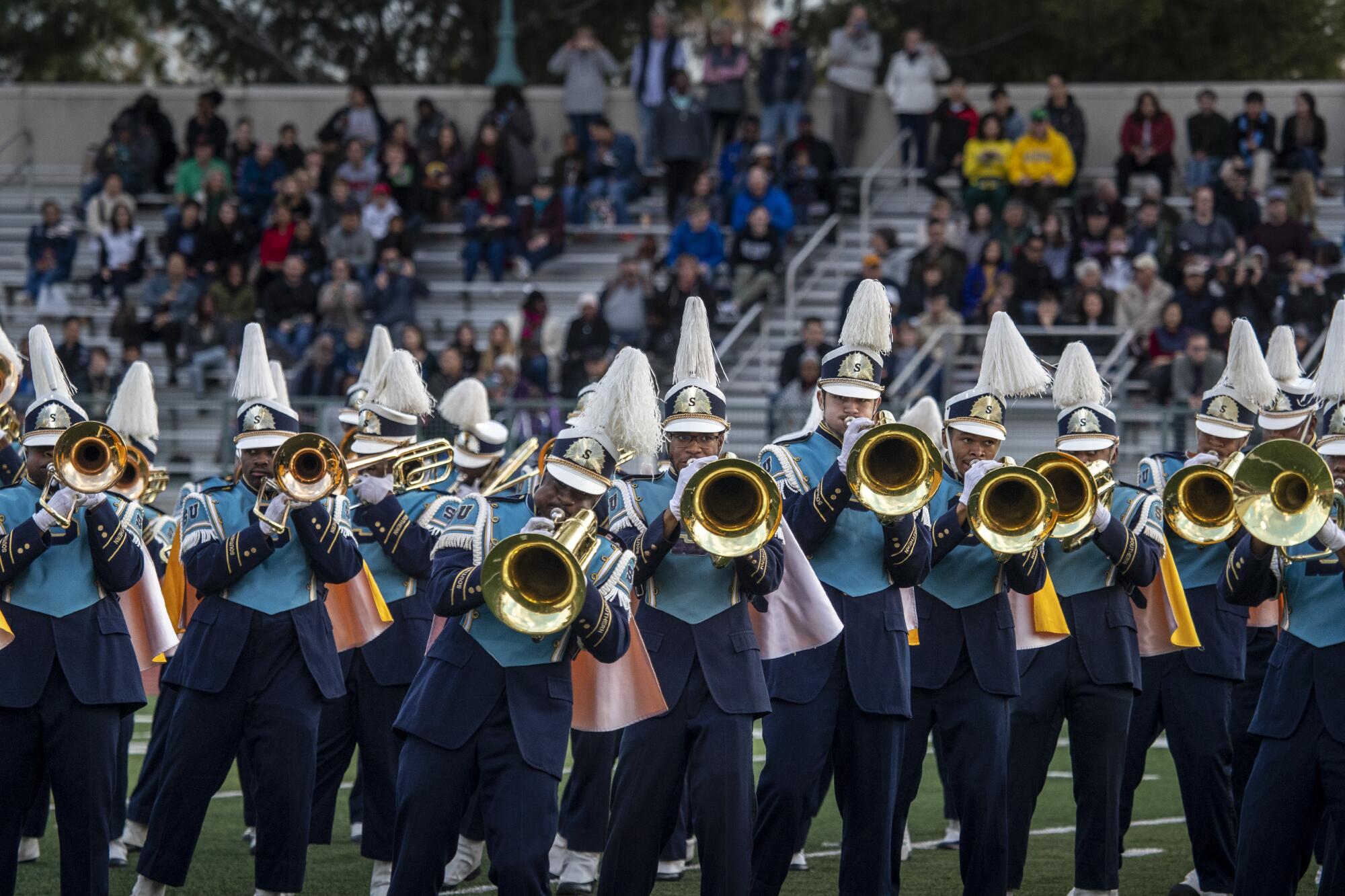
- Share via
After a long practice one day about a year ago, Southern University band director Kedric Taylor huddled his 200-plus-member squad for a quick message.
Zaid Soberanis-Ramos, a freshman at the time, didn’t expect much. He thought Taylor would give the team instructions for the weekend’s game or a critique of their practice that day. But when Taylor told the band, known as the “Human Jukebox,” that they had been selected to perform in the 2020 Rose Parade, Soberanis-Ramos’ heart leapt with excitement.
“I was in shock because we were going to be in my backyard,” said Soberanis-Ramos, a Compton native. “It’s something that I never thought I would do before. To be a part of this, it’s simply a blessing.”
Soberanis-Ramos, 19, said he always watched the Rose Parade on television growing up, but could never make the 23-mile drive to Pasadena to see the New Year’s Day festivities in person. Instead, choosing to attend a historically black university in Baton Rouge, La., unexpectedly had provided him with an opportunity he had dreamed of. Merely being in the parade, he said, “gives me hope.”
And that’s what this year’s parade is all about.
Tournament of Roses President Laura Farber thought of this year’s theme, “The Power of Hope,” with people like Soberanis- Ramos in mind. Farber, the first Latina to serve in the role, said she wanted to use her platform to promote diversity and inclusion.
The Human Jukebox, along with many of the other bands that will perform, embody that, she said. She’s excited for Southern California and the rest of the world to see that impact.
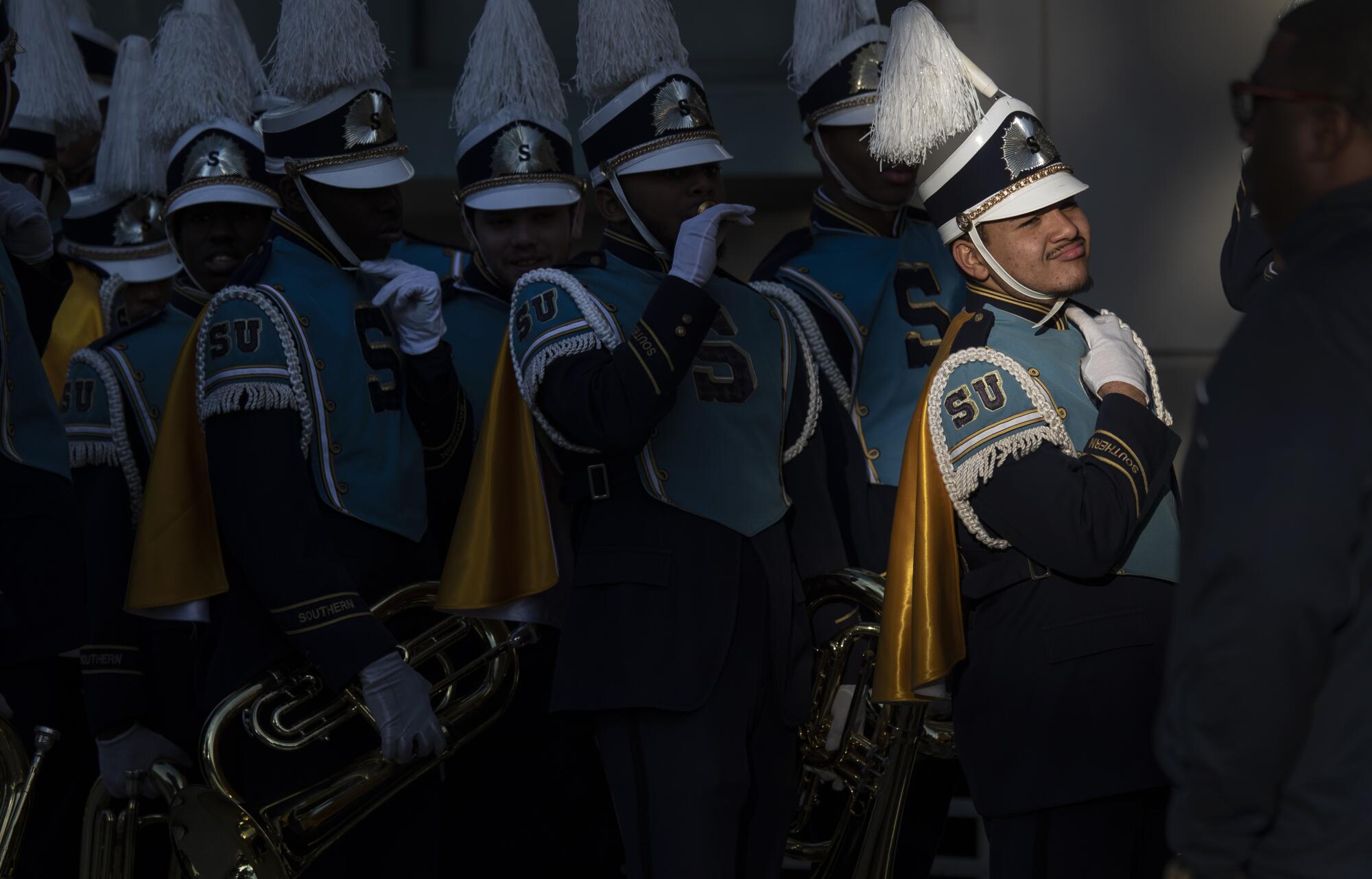
“With the country and the world as divided as it is right now, we want hope to bring everyone together,” Farber said. “That’s what America’s New Year celebration does. Hope is a powerful concept, and we wanted to focus on that.”
The word “hope” had never been used in the previous 130 Rose Bowl themes, Farber said. Her life revolved around hope, she said, and she knew that the word would resonate with others if she centered the parade on it.
Farber was born in Argentina and immigrated to the United States with her family when she was young to escape the country’s military dictatorship that seized power in the mid-1970s. She graduated from UCLA in 1987 and then from Georgetown Law three years later. Today she’s a wife, mother and attorney in Pasadena. She volunteered for the Tournament of Roses for 26 years and slowly climbed the ranks.
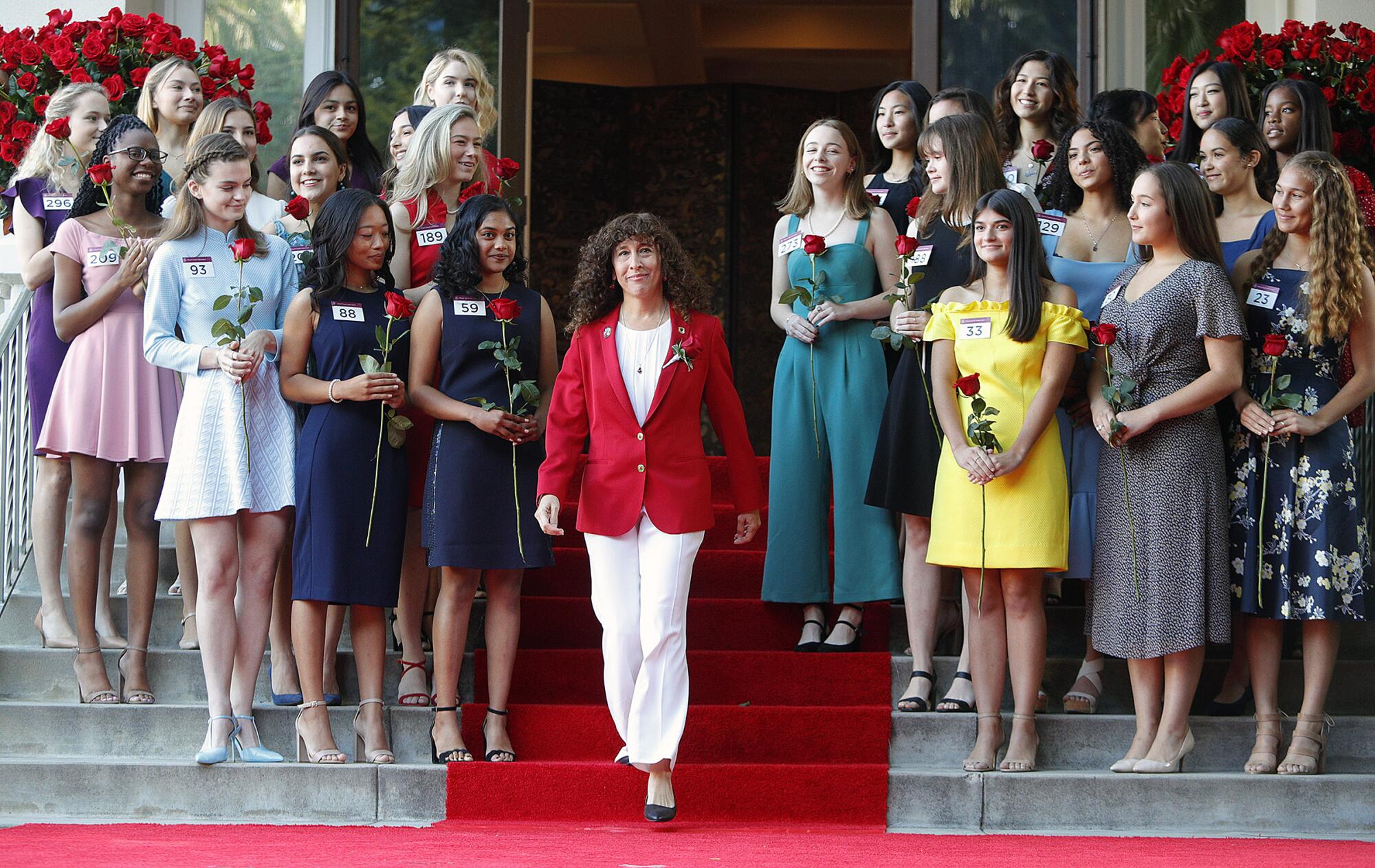
With each passing year, she saw the leadership diversify. The past five years produced the first African American and the first Asian American presidents of the organization. Farber said the best part of the job is the people. Hearing their stories inspires her.
“Sometimes you don’t appreciate the impact of our events until you meet people and see how engaged they are,” Farber said. “It changes them, especially kids who have never left their towns or cities and are now playing on a big international stage.”
That description fits Soberanis-Ramos, who started playing the horn at Manuel Dominguez High in Compton.
His parents, who immigrated from Mexico before he and his four younger siblings were born, never attended college and worked hard to support them, he said. He used band as a way to keep himself busy. He practiced for hours by himself, meticulously going over songs and honing his technique. He wanted to use music to better his life, he said.
“All the dedication and hard work started paying off,” he said. “It was getting me ready for the real world — the practices, the uniforms, the precision. When you see the joy on people’s faces when you do a song and their heads are bopping, it makes it all worth it.”
Soberanis-Ramos, a computer science major who wants to work with mobile technology, said that a friend told him about Southern University, and he began watching videos of the marching band on YouTube. He saw “one of the best bands in the world,” as Farber describes them.
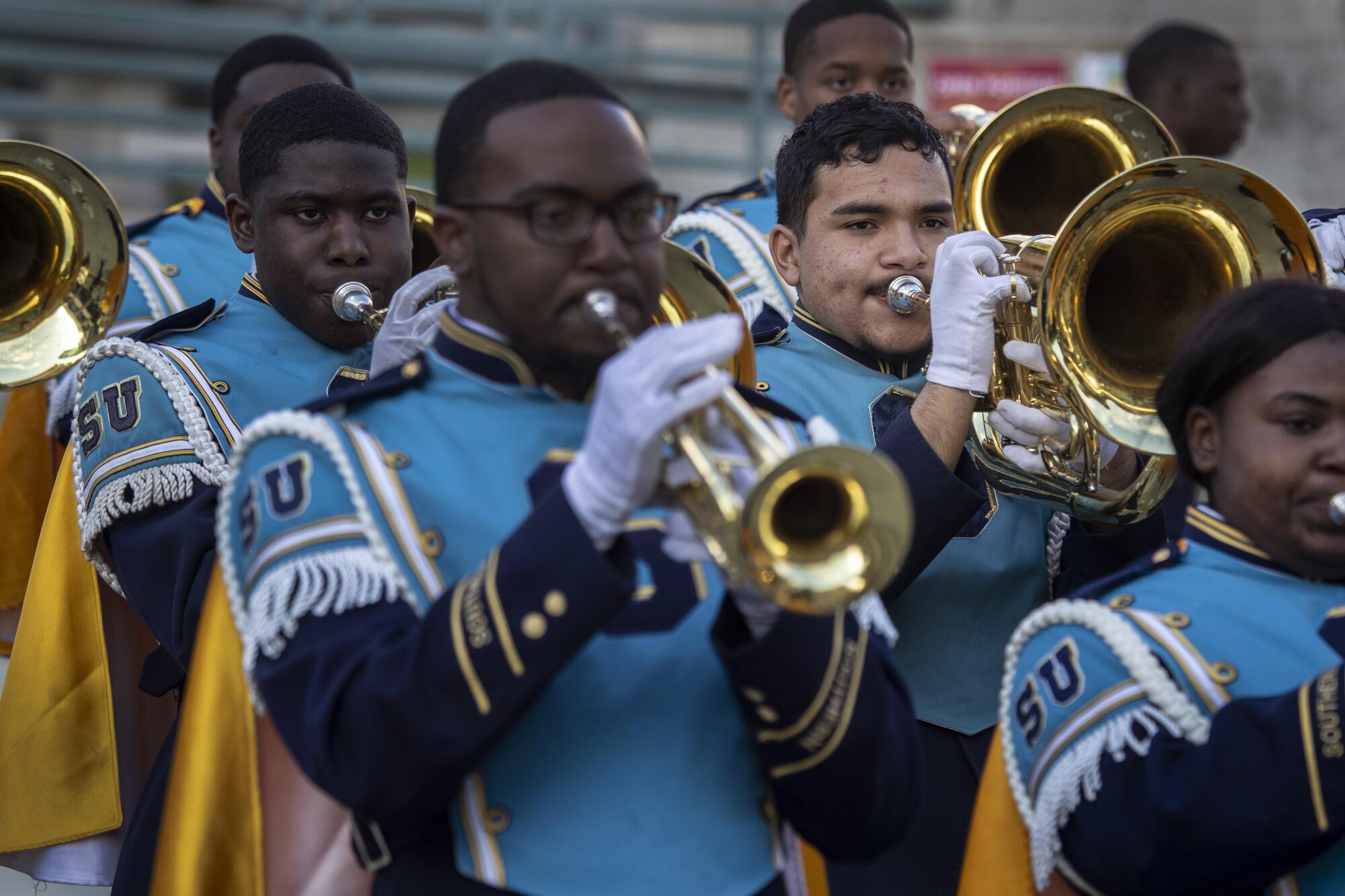
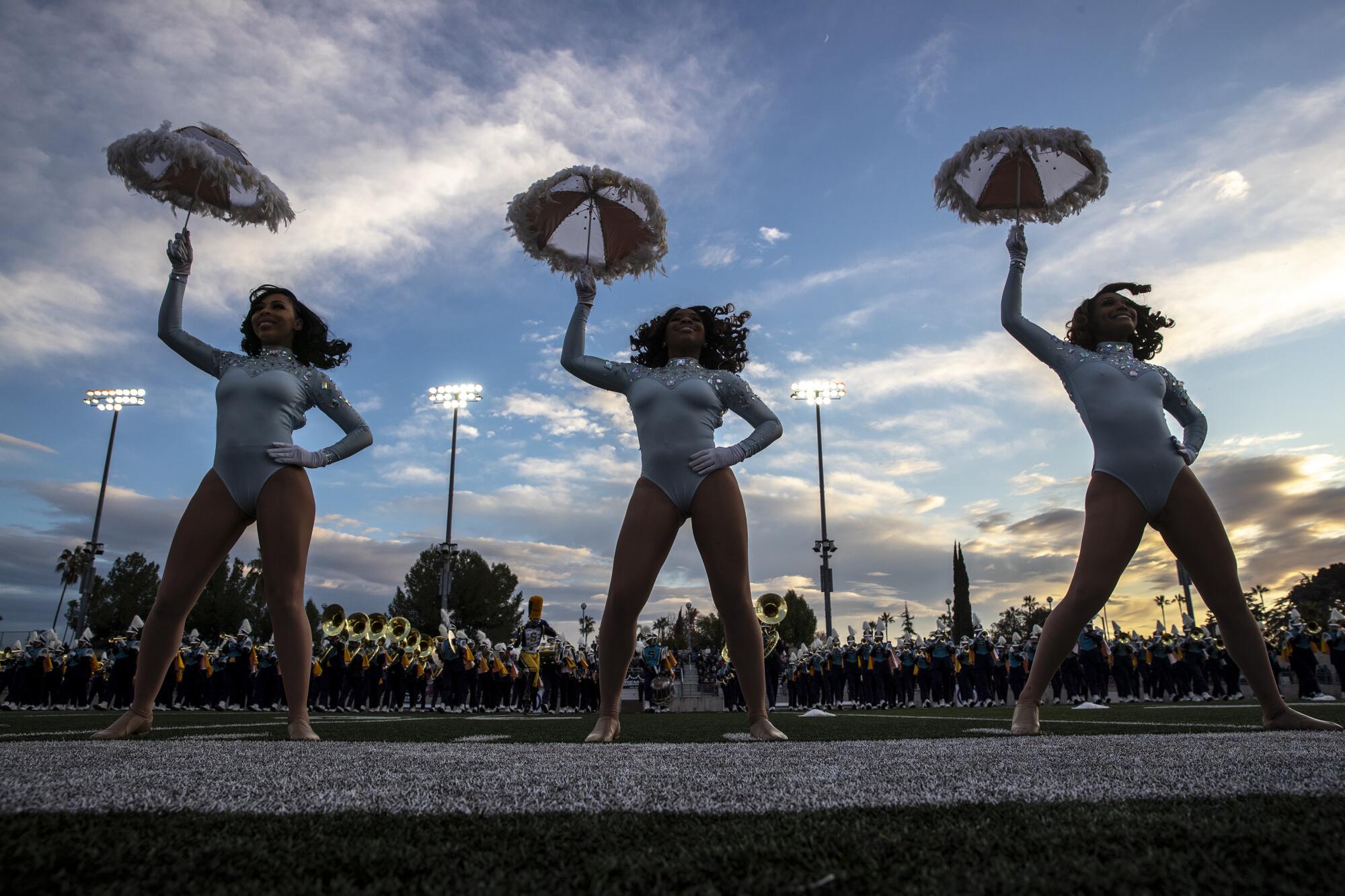
The band is used to performing at elite venues. Since its creation in 1947, it has played at Super Bowls, presidential inaugurations and the 1980 Rose Parade. Most famously, it headlined the reopening of the Louisiana Superdome in 2006 after Hurricane Katrina. After researching and witnessing what the band stood for, Soberanis- Ramos knew that he wanted to be a part of it. He auditioned and was accepted.
Soberanis- Ramos said that attending a historically black university was eye-opening at first, noting the Southern hospitality that pervaded the campus. The positive energy and genuine sense of camaraderie gave him “a huge culture shock,” he said. He and his band mates now carry those unique feelings with them to Pasadena.
Bands from historically black colleges and universities (HBCU) are known for their pride and competitiveness. In 2017, ESPN’s The Undefeated ranked the Human Jukebox as the best HBCU band in the country. It has called itself the “Human Jukebox” since the 1960s because it boasts that it can play the “Top 40” hits of the day.
Recently, it’s lived up to the name.
At Bandfest, a showcase of the parade bands on Dec. 30, they dressed in their powder uniforms and yellow capes, and moved across the whole field of Pasadena City College stadium, dipping and weaving into different formations while they performed Lil Nas’ hit “Old Town Road.” Farber even started dancing as she watched from the sideline.
Lizzo, the Associated Press entertainer of the year, featured the band in a December music video. It also performed at a church service and a Los Angeles Lakers halftime show in Staples Center while they were in Los Angeles.
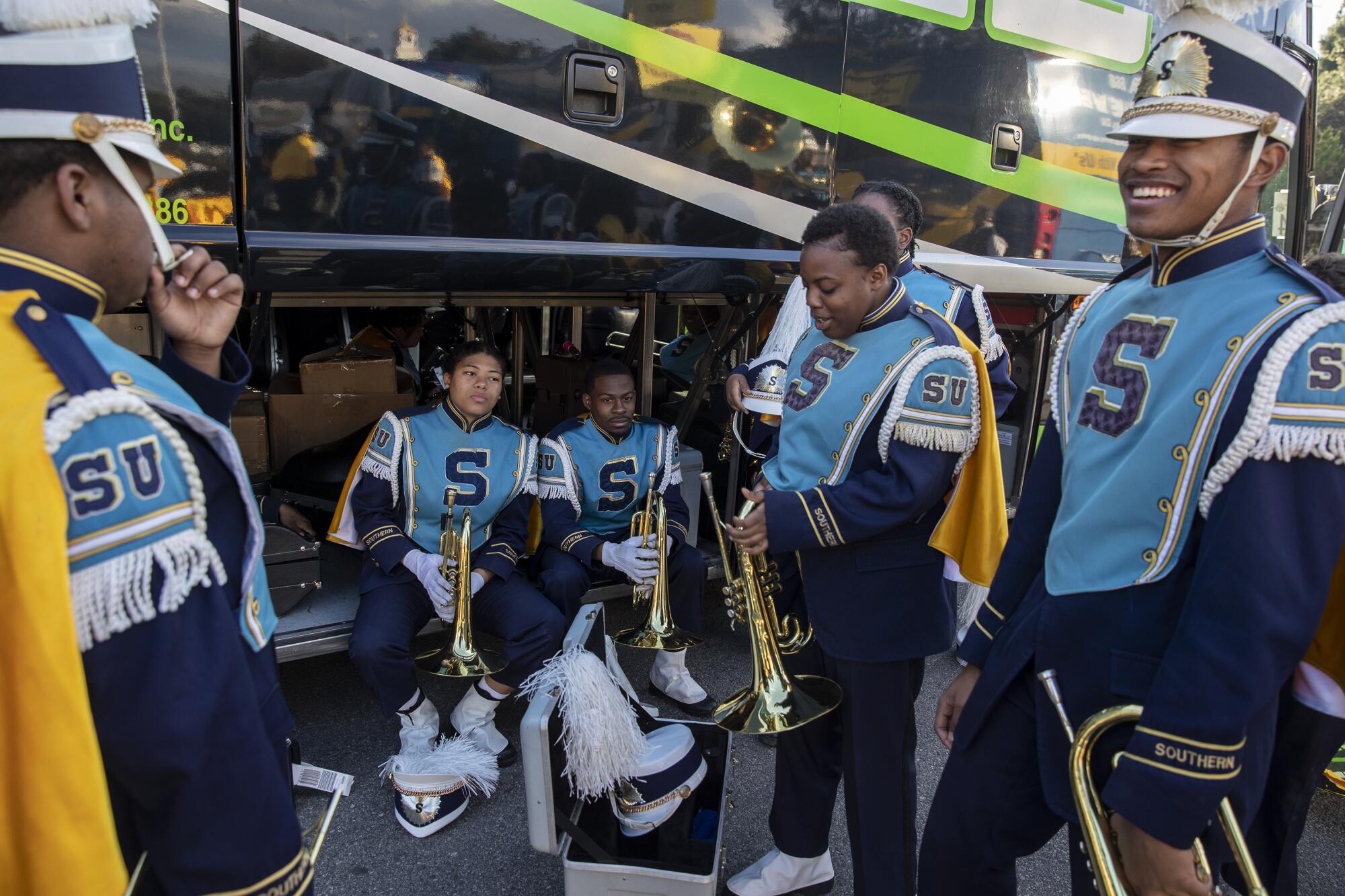
Taylor said that Soberanis-Ramos is a great ambassador for the band, and he is happy they’ll play near the student’s hometown. Taylor also is glad that the Human Jukebox may provide some Californians with their first introduction to an HBCU band. He’s especially pleased that they are participating in this year of “Hope.”
“This theme fits our program to a T,” Taylor said. “God created all of us as equal, and when you have everybody on the same page and pulling in the same direction, you can accomplish way more.”
Soberanis- Ramos said it’s important to put on a performance that spectators won’t forget, especially given this year’s theme.
“I’m coming back home, and I want people here to see what HBCUs stand for and what we’re about,” he said. “I want them to see the passion we have and hopefully it will open their eyes. We’re carrying a lot of weight.”
Bands from Denmark, El Salvador, Japan and seven other counties will play at the parade, along with bands from 47 states. Farber said it was easy to pick Southern University when she and the music committee sifted through the pile of applications.
The 1 million people expected to watch the performance in person will be “blown away,” she said.
“It’s just going to lift everybody up,” she said.
More to Read
Sign up for Essential California
The most important California stories and recommendations in your inbox every morning.
You may occasionally receive promotional content from the Los Angeles Times.













